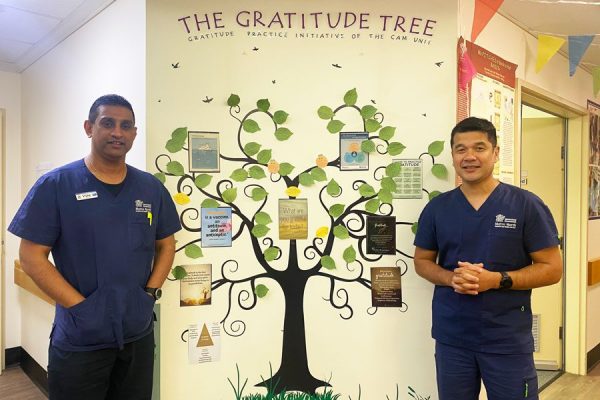Growing gratitude in dementia care

Vijay Pillay, Nurse Unit Manager and Reyonald Javier, Clinical Nurse Clinical Facilitator with the gratitude tree in the CAM Unit.
Staff at The Prince Charles Hospital’s Cognitive Assessment and Management (CAM) unit are taking an innovative approach to specialised care to frail patients with dementia.
The Gratitude Nursing initiative aims to support nursing staff to consciously practice gratitude to help enhance patient care, elevate staff well-being, and strengthen teamwork in the CAM Unit.
As part of the initiative, the unit has introduced a gratitude tree at the entrance to the unit to allow staff and visitors to post personalised messages of appreciation.
CAM Unit Nurse Unit Manager Vijay Pillai said that the gratitude tree creates a shared space to appreciate and recognises staff efforts in working in a demanding and mentally challenging environment.
“Patients living with dementia can display a variety of behaviours including verbal or physical agitation, irregular motor behaviour, anxiety, irritability and disinhibition,” Vijay said.
“They can also have delusional characteristics, hallucinations and sleep and appetite alterations.
“The behaviours exhibited by patients diagnosed with dementia or other cognitive conditions can be challenging for staff to manage, even the most highly trained staff. It is natural for staff to sometimes experience feelings of worry or uncertainty.”
Patients can have an emotional reaction when they sense hesitation or concern from staff, causing heightened verbal expression or physical agitation.
Creating a positive care environment for patients with dementia is challenging due to the complexity of care involved.
“By encouraging staff to take a positive approach by focusing on being grateful for their colleague’s efforts, these positive feelings can influence similar feelings in our patients,” Vijay said.
“This helps strengthen staff bonds, enhances the well-being of staff during each shift and boosts team morale.”
Since adopting this new approach, the CAM Unit staff have observed a decrease in irregular motor and verbal agitation in patients and a reduction in staff occupational incidents.
The CAM Unit has approximately 200 admissions each year, with patients staying an average of 25 days.
